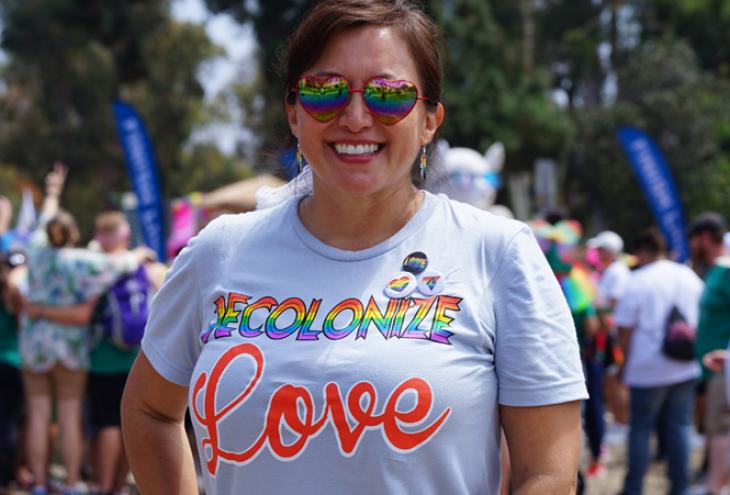Sheila Lopez still vividly recalls the first time she fully shared her life story in front of an audience. A member of the Navajo tribe, Lopez was the first in her family to attend college. While an undergraduate pursuing a degree in electrical engineering at Northern Arizona University, Lopez worked in the school’s multicultural engineering program office.
During her time there, Lopez met with a group of high school students and their mothers who had traveled up from Phoenix. She and others took time to collectively talk about their lives with this group. “There were five of us talking to them, and the first four of them talked about how great everything is,” recalls Lopez, this year’s winner of the AISES Blazing Flame award. “Then I said, ‘My story is nothing like that.’ I talked about how I got pregnant in high school and wasn’t prepared to go to college and all the struggles I was having.”
It’s a story that Lopez has shared countless times since, not to elicit sympathy but to let others — especially young Native students — know that struggles are inevitable and overcoming them is possible. “When I talk to Native students, I share my life and struggles. I know I don’t have a fluffy story — it was challenging,” she says. “But I always kept my focus on how to take care of my children and that I want to leave the world better for my kids. When you share that, students can relate to you.”
That willingness to share her story and encourage others to overcome the challenges in their lives has come in handy in Lopez’s past role as diversity staffing program manager at tech giant Intel. For the past seven years, it has been Lopez’s mission to develop and manage staffing programs to help Intel achieve its goals in hiring underrepresented minorities and females in technical roles. It’s a job Lopez flourished in, helping Intel reach full representation — meaning that the percentage of women and underrepresented minority employees at the company now equals the percentage indicated in the U.S. skilled labor market as a whole — a full two years ahead of schedule.
While part of Lopez’s story is about overcoming the unavoidable challenges that come with being a Native and Hispanic woman pursuing a degree in a field dominated by white males, it’s also about the amazing possibilities that come in STEM fields. Indeed, before Lopez began working in human resources, she had a long and successful run in a variety of technical positions at both HP and Intel.
When I talk to Native students, I share my life and struggles. I know I don’t have a fluffy story — it was challenging.
Her first job after graduating from college was at HP as a manufacturing engineer, a position that allowed her and her family to live in Singapore for four months. Later, Lopez held positions in everything from software testing and validation to work in semiconductor fabrication. “I went from manufacturing wafers all the way to the end where you test the chips,” she says. “It’s surreal what I’ve been able to do. If I could tell that little girl I once was all the things that she would do, she would have laughed at me.”
Paving the way for others to follow the same unlikely path she has blazed has been a constant priority for Lopez, both in her professional role at Intel and as a long-time member of the Phoenix AISES Professional Chapter and as a mentor to and teacher of countless Native students. While she worked as a visiting scientist at HP, Lopez would visit schools and Girl Scout troops to teach and demonstrate STEM experiments. “I knew that I could be a role model as a Native person and a female in the STEM field. I really wanted to encourage females to think about STEM,” she says.
Since joining Intel, she has helped the Sacaton (Gila River Indian Reservation) Middle School students prepare for national science fairs, and Lopez led the Phoenix AISES Professional Chapter to get involved with the Kyrene School District’s NAPAC (Native American Parent Advisory Committee) family days to include STEM activities.
More recently, Lopez was named Intel’s veterans and LGBTQ program manager, charged with replicating her success bringing more women and underrepresented minorities to Intel. It’s a very personal quest. “My two adult children came out as gay, and when they did, I didn’t understand and was ignorant about the community and what it meant,” she says. “I found out about a lot of possible challenges for my kids and saw the statistics about suicide and said, ‘This is not OK.’ I want to educate others because it shouldn’t be this way.”
As with the other aspects of her life, Lopez has embraced this new mission with zeal, helping to lead to the creation of the first PFLAG (an LGBTQ advocacy group) chapter focusing on Native Americans. “This past March, we had the first-ever two-spirit powwow in Arizona with Native PFLAG, and that was huge,” she says. “I’m just so excited about the chance to connect with parents who might not understand what their children need. I feel like this is the job I’m meant to do right now.”













